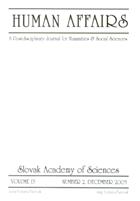HUMAN NATURE AS A PART OF HISTORICAL ESSENCE
HUMAN NATURE AS A PART OF HISTORICAL ESSENCE
Author(s): Peter SýkoraSubject(s): Philosophy
Published by: SAV - Slovenská akadémia vied - Slovenská Akadémia Vied - Kabinet výskumu sociálnej komunikácie
Keywords: Historical essence; Aristotle; essentialism; genetics; behaviour; feminism
Summary/Abstract: Human nature has been until recently taken as the essence along with other essences of biological species, chemical elements, etc. as parts of the same class of being. In this essay I will show that this class is not homogenous and what this means for our understanding of human nature. From a biological point of view all humans belong to the species of Homo sapiens and therefore the problem of human nature has to be discussed also with relation to the ontological status of biological species, for biological species are not natural kinds. The essence of Homo sapiens (and human nature) cannot be conceptualized in the same way as the essence of Aurum. I am going to show that this difference in conceptualization demands the introduction of a new concept—historical essences, which in contrast to essences of chemical elements are not spatiotemporally unrestricted. Historical essences define biological species, including Homo sapiens, not by their common features, but by referring to a common ancestor. Despite the fact that historical essences are outcomes of historical events appearing during biological evolution, they are not cultural/social constructions. Human nature is a part of a historical essence. I believe that a traditional nature/nurture dichotomy of human nature is satisfactorily solved by imprinting-like behaviour models: genetically determined forms of behaviour on the one hand, and environmentally constructed contents of behaviour on the other.
Journal: Human Affairs
- Issue Year: 2003
- Issue No: 2
- Page Range: 137-150
- Page Count: 13
- Language: English

